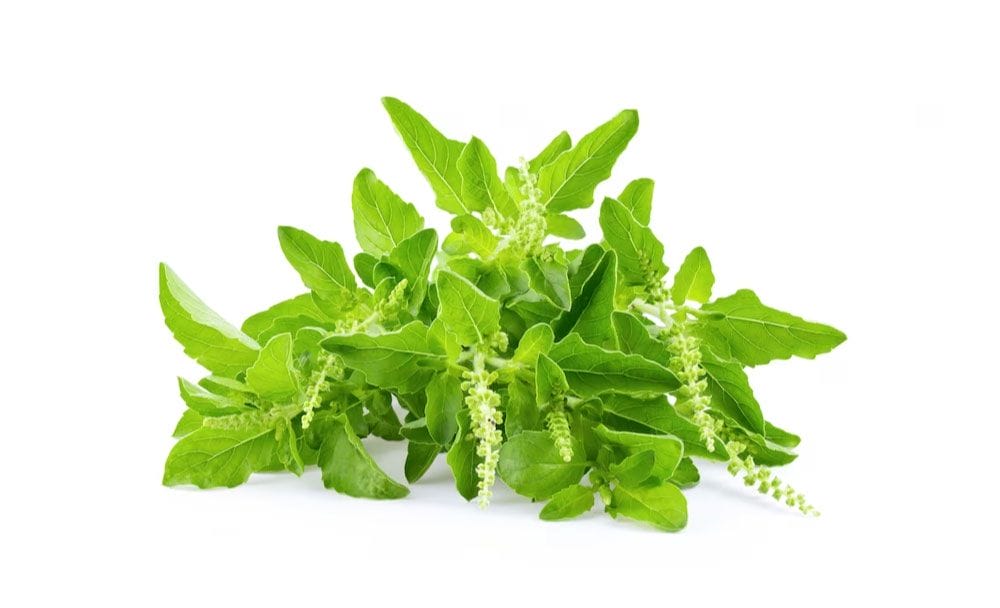
Tulsi, also known as holy basil, is an aromatic shrub in the basil family Lamiaceae that is thought to have originated in north-central India. Tulsi is a sacred plant in Ayurveda that is revered as an “elixir of life” and is known as “The Incomparable One,” “Mother Medicine of Nature” and “The Queen of Herbs”.[1] Ayurveda has celebrated Tulsi leaves benefits since time immemorial.
Within India, Tulsi has been adopted into spiritual rituals and lifestyle practices that provide a vast array of health benefits that are just beginning to be confirmed by modern science. This emerging science on Tulsi, which reinforces ancient Ayurvedic wisdom, suggests that Tulsi leaves are a tonic for the body, mind, and soul and offer solutions to many modern-day health problems.[1]
Nutritional Value of Tulsi Leaves
| Nutrient | Amount per 100g |
| Calories | 23 kcal |
| Protein | 3.15 grams |
| Fat | 0.64 grams |
| Fiber | 1.6 grams |
| Vitamin A | 2648 IU |
| Vitamin C | 18 mg |
| Calcium | 177 mg |
| Iron | 3.17 mg |
| Potassium | 295 mg |
| Carbohydrates | 2.65 grams |
Tulsi, as perceived by Ayurveda
Tulsi is perhaps one of the best examples of Ayurveda’s holistic lifestyle approach to health. Tulsi tastes hot and bitter and is said to penetrate the deep tissues, and dry tissue secretions, and normalize Kapha and Vata.[1]
The traditional uses of Tulsi leaves in Ayurveda might be due to some intrinsic properties in many varieties of Tulsi such as the essential oils containing an anti-inflammatory compound called eugenol, and various acids with antioxidant and anti-inflammatory properties.[2]
Properties Of Tulsi
Ayurveda attaches great importance to Tulsi. Additionally, growing scientific research is proving the physical and mental health benefits of Tulsi. Ayurveda lists the following properties of Tulsi.
- Anti-pyretic (relieves fever)
- Anti-inflammatory
- Anti-microbial
- Anti-allergic
- Anti-diabetic
12 Incredible Benefits of Tulsi Leaves You Must Not Miss Out
Considered a potent adaptogen, Tulsi has a unique combination of pharmacological actions that promote well-being and resilience. In addition to these health-promoting properties, uses of Tulsi leaves include treatment for a range of conditions including anxiety, cough, asthma, diarrhea, fever, dysentery, arthritis, eye diseases, otalgia, indigestion, hiccups, vomiting, gastric, cardiac, and genitourinary disorders, back pain, skin diseases, ringworm, insect, snake and scorpion bites and malaria.
Let’s explore 12 amazing benefits of Tulsi leaves without further ado.
1. Potent Antioxidant
Polyphenol Rosmarinic acid present in Tulsi acts as a powerful antioxidant. It protects the cells in the body from cell damage caused due to excessive oxidation.[2]
2. Antibacterial Benefits
Carvacrol and terpene are the antibacterial agents present in this remarkable plant. It helps keep the body safe from a bacterium that causes illness.[2]
3. Promotes Heart Health
Tulsi leaves have cardioprotective properties that help in reducing the risk of heart disease. Tulsi leaves benefits in lowering blood pressure, and cholesterol levels, and prevents the formation of blood clots.[2] [3]
4. Regulates Blood Sugar
Tulsi leaves have hypoglycemic properties that help in regulating blood sugar levels.[2] Eugenol is the main ingredient responsible for controlling the blood sugar levels in the body. Studies have shown that Tulsi’s beneficial effect on blood glucose levels is due to its antioxidant properties.[3]
5. Reduces Mental Stress
Eugenol and caryophyllene are the most imperative adaptogen agents present in the chemical formula of Tulsi. These are very effective in lowering the corticosterone levels that are the main cause of stress.[2]
If you are struggling to get rid of mental stress explore our Ayurvedic tips to cope up with stress
6. Immuno-modulator
It is very vital to have some immuno-modulator in the body that stabilizes, recovers, and maintains the proper balanced functioning of the immune system. Tulsi leaves possess excellent immune-enhancing properties that prepare the body against foreign elements like bacteria, viruses, microbes, allergens, etc. Thus, it maintains the overall balance in the body.[2]
7. Relieves Respiratory Disorders
In the Indian Materia Medica, Tulsi leaves separates are portrayed for the treatment of bronchitis.[2]
A decoction of the Tulsi leaves, with honey and ginger is an effective remedy for asthma, influenza, cough, and cold.[3]
8. Improves Digestion

Metabolic stress due to poor diet, low physical activity, and psychological stress is a prominent feature of modern lifestyle.[1] This causes obesity, hypertension, high cholesterol, and poor glucose regulation and is associated with chronic inflammation that causes diabetes and heart diseases.[1] There is evidence to suggest that Tulsi can assist in dealing with many features of metabolic syndrome and their consequences.[1]
9. Improves Oral Health
The benefits of eating Tulsi leaves include having good oral health. Tulsi leaves when dried in the sun and powdered are used as a toothpaste. This helps in effective dental health, combats bad breath and massages the gum for good health.[2] [3]
One of the other effective benefits of eating Tulsi leaves is that they help in combating ulcers and other mouth infections.[2] [3]
10. Treats Skin Disorders

Ayurveda lists time-tested benefits of tulsi for skin health. Applied locally, Tulsi leaves juice is beneficial in the treatment of ringworm and other skin diseases. Uses of Tulsi leaves have also proven beneficial in the treatment of leukoderma. [2] [3]
11. Improves Eye Health
The juice of Tulsi leaves is an effective remedy for sore eyes and night blindness, generally caused due to a deficiency of Vitamin A.[2] [3]
12. Cures Insect Bites
One of the other benefits of Tulsi leaves is that the herb is a preventive and curative method for insect stings or bites. Fresh juice applied to the affected area or a paste of fresh roots proves effective against insect bites.[2] [3]
How To Use Tulsi
You can consume fresh Tulsi leaves either by chewing them directly or by infusing them into your tea.
Side Effects Of Tulsi
Studies suggest that consuming Tulsi leaves daily does not result in any side effects in the long term. However, in case of any side effects, it’s advisable to consult your healthcare provider.
Precautions To Take While Using Tulsi
- Tulsi contains estrogen which is known for causing a contraction of the uterus. This may be dangerous for embryo development.
- Research suggests that consuming Tulsi leaves in excessive quantities can affect sperm count in males.
- The ursolic acid present in Tulsi can hamper the menstrual cycle in women.
- Tulsi may also lower blood glucose levels in people with diabetes.
FAQs
1. What are the Ayurvedic benefits of Tulsi leaves?
Tulsi, also known as holy basil, is an aromatic shrub in the basil family Lamiaceae that is thought to have originated in north-central India. Tulsi is a sacred plant in Ayurveda that is revered as an “elixir of life” and is known as “The Incomparable One,” “Mother Medicine of Nature” and “The Queen of Herbs”.[1] Ayurveda has celebrated the benefits of eating Tulsi leaves since time immemorial.
Tulsi is perhaps one of the best examples of Ayurveda’s holistic lifestyle approach to health. Tulsi tastes hot and bitter and is said to penetrate the deep tissues, and dry tissue secretions, and normalize Kapha and Vata.[1]
2. What are the benefits of eating Tulsi leaves?
The benefits of eating Tulsi leaves include having good oral health. Tulsi leaves when dried in the sun and powdered are used as a toothpaste. This helps in effective dental health, combats bad breath, and massages the gum for good health.[2] [3]
One of the Tulsi leaf uses is that it helps in combating ulcers and other mouth infections.[2] [3]
3. Does Tulsi assist in improving respiratory disorders?
In the Indian Materia Medica, Tulsi uses are portrayed for the treatment of bronchitis.[2]
A decoction of the Tulsi leaves, with honey and ginger is an effective remedy for asthma, influenza, cough, and cold.[3]
4. What are the uses of Tulsi leaves in promoting heart health?
Tulsi leaves have cardioprotective properties that help in reducing the risk of heart disease. It lowers blood pressure, and cholesterol levels, and prevents the formation of blood clots.[2] [3]
5. Does Tulsi leaves cure skin disorders?
Applied locally, Tulsi leaves juice is beneficial in the treatment of ringworm and other skin diseases. Uses of Tulsi leaves have also proven beneficial in the treatment of leucoderma.[2] [3]
Conclusion
Due to the immense medicinal value of Tulsi leaves, they have been used for centuries in Ayurveda. It has immune-boosting, respiratory, digestive, stress-relieving, heart-protective, skin, and blood sugar-regulating properties. Tulsi leaves are also considered a rasayana, which helps in promoting longevity. It helps in improving the overall health and well-being of an individual. It can be used to treat various ailments and promote overall health and well-being. Incorporating Tulsi leaves into your daily routine can have a positive impact on your health.
References:
- Anti-inflammatory and antipyretic activities of Ocimum sanctum fixed oil, S Singh, DK Majumdar, International Journal of pharmacognosy, 1995
- Tulsi – Ocimum sanctum: A herb for all reasons, Marc Maurice Cohen, 2014 Oct-Dec
- The Benefits of Holy Basil (Tulsi), November 2023
- The Clinical Efficacy and Safety of Tulsi in Humans: A Systematic Review of the Literature Negar Jamshidi and Marc M. Cohen, 2017
- Effect of tulsi (Ocimum Sanctum Linn.) on sperm count and reproductive hormones in male albino rabbits, October 2010, International Journal of Ayurveda Research
- A REVIEW ON EFFECT OF TULSI (OCIMUM SANCTUM) IN HUMAN AS A MEDICINAL PLANT, September 2020, Monoj Maiti
















